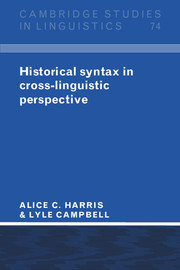Book contents
- Frontmatter
- Contents
- Preface
- List of abbreviations
- 1 Introduction
- 2 The history of historical syntax: major themes
- 3 Overview of a theory of syntactic change
- 4 Reanalysis
- 5 Extension
- 6 Language contact and syntactic borrowing
- 7 Processes that simplify biclausal structures
- 8 Word order
- 9 Alignment
- 10 On the development of complex constructions
- 11 The nature of syntactic change and the issue of causation
- 12 Reconstruction of syntax
- Appendix
- Notes
- References
- Index of languages and language families
- Index of scholars
- Index of subjects
9 - Alignment
Published online by Cambridge University Press: 05 June 2012
- Frontmatter
- Contents
- Preface
- List of abbreviations
- 1 Introduction
- 2 The history of historical syntax: major themes
- 3 Overview of a theory of syntactic change
- 4 Reanalysis
- 5 Extension
- 6 Language contact and syntactic borrowing
- 7 Processes that simplify biclausal structures
- 8 Word order
- 9 Alignment
- 10 On the development of complex constructions
- 11 The nature of syntactic change and the issue of causation
- 12 Reconstruction of syntax
- Appendix
- Notes
- References
- Index of languages and language families
- Index of scholars
- Index of subjects
Summary
Introduction
In this chapter we treat changes in alignment and propose a universal which accounts for the strong limitations on possible alignment changes. In this work the term alignment is used to refer to the distribution of morphological markers or of syntactic or morphological characteristics; it is intended as a neutral way of referring to ergative, accusative, and other distributional patterns. The focus here is on the alignment of case marking. The alignment typology assumed is based on that established by Sapir (1917). This includes the three types ergative, active(-inactive), and (nominative-)accusative, though Sapir did not use these names for them. Following Sapir, these may be represented as in table 9.1. We have added a further type in the same format, but the focus in this chapter is on the first three. Table 9.1 represents the distributional definition of ergative alignment as a system having one marker, A (“absolutive case”), shared by the direct object and the subject of an intransitive, distinct from another marker, B (“ergative case”), used for the subject of a transitive. This may be illustrated from Andi, a language of the Daghestan (North East Caucasian) family, where the absolutive case has a zero marker.
- Type
- Chapter
- Information
- Historical Syntax in Cross-Linguistic Perspective , pp. 240 - 281Publisher: Cambridge University PressPrint publication year: 1995



